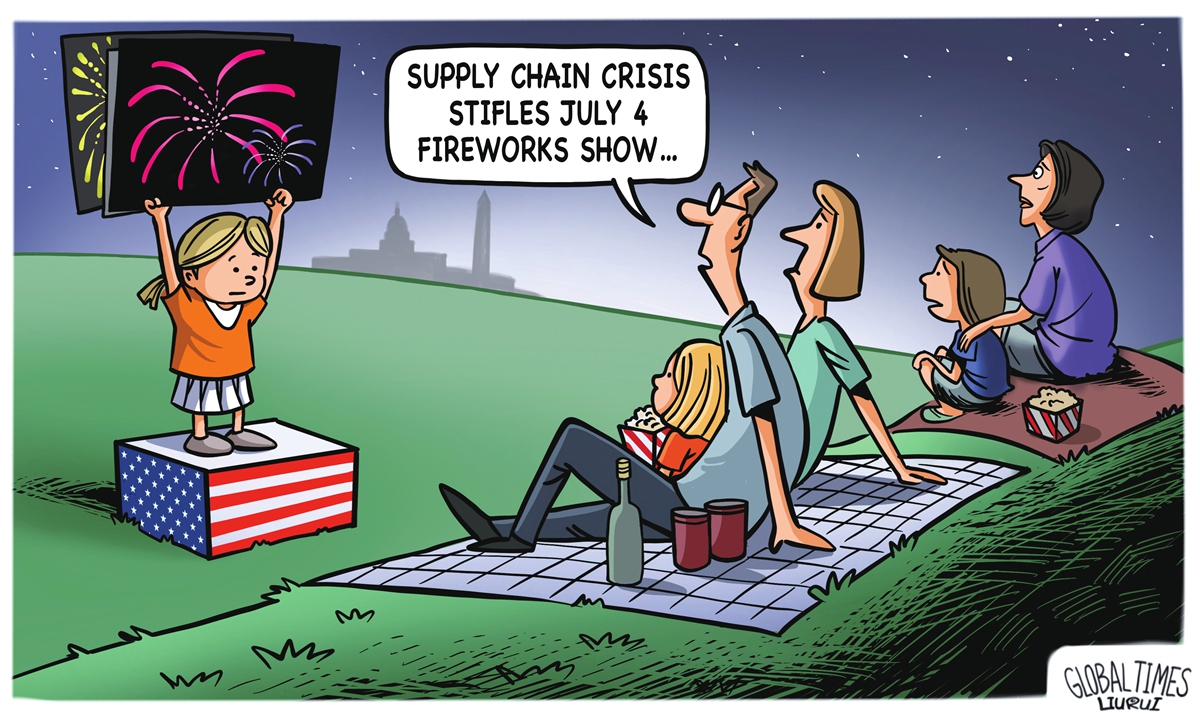On July 4, US should reflect on how to mind its own affairs: Global Times editorial

Stifled celebrations. Illustration: Liu Rui/GT
July 4 this year marks the 246th Independence Day of the US. But prior to the day, the US media was filled with news reports such as the death of Black motorist Jayland Walker who were fired on by police at least 60 times, and the case of a 10-year-old rape victim forced to travel from Ohio to Indiana for an abortion. It seems that they shouldn't exist in a "civilized and developed society," but are indeed concrete microcosms of current American society facing crisis.In his Independence Day speech a year ago, US President Joe Biden said with "confidence" that "America is coming back together." Yet a year later, what is seen is a more divided, confused and chaotic America. The deep-seated problems accumulated in the US for a long time have reached a point that they have erupted massively. Issues such as mass shootings, political polarization, the gap between the rich and poor, and racial conflicts, partisan politics and women's rights have been alarming against the backdrop of the COVID-19 pandemic and severe inflation.
Recently, three consecutive rulings of the Supreme Court of the US further tore open the social wounds of gun violence and women's abortion rights, exposed severe differences within Washington on climate change issue, which are generally considered serious violations of freedom and democracy and a retrogression of human rights and civilization. It has made many people feel uneasy, angry, and even scared. Some even assert that a new culture war and a value war have broken out in the US. From the outside, the US now looks like a teetering giant, who may stomp the earth at any moment due to its loss of balance.
Still, the US is struggling to top up its so-called leadership image. Biden's recent diplomatic footprints have extended more than 10,000 kilometers from the Summit of Americas in Los Angeles to the G7 Summit in Schloss Elmau, Germany, to the NATO summit in Madrid, Spain. Although the US government is trying its best to show "leadership" to the world, the bigger question for the world is whether the US still has the ability to lead itself.
However, in recent years, the US has been most enthusiastic about transferring risks and conflicts abroad. Many Washington elites see attacks on other countries, including China, as a magic trick to cover up internal problems and inspire social loyalty.
In the US, criticizing China has become "political correctness", and scolding China has become a strategic need of the US. But it has been proven time and time again that the US cannot "transfer" its own problems. What has been transferred is limited energy of Washington's decision-making circle, which should have been focused on solving the domestic problems of the US. As such, various problems in the US have accumulated, which has messed up the US and the world.
On this particular day of Independence Day, we sincerely advise the US to handle its own issues first and mind other people's business less. This is good for the US and everyone. The situation at home has sent a strong signal that cannot be ignored by Washington. The functional dislocation and dysfunction of US governance of internal affairs must be corrected soon. Washington likes to pass the buck, which is impossible to be realized. In other words, since the US is "sick," it should "take medicine" obediently, rather than force others to do so. For Washington, the "medicine" is itself, and so is its biggest opponent.
The Global Times published an opinion piece 10 years ago to urge the US to "reform and open up." The article argues that as a "3A" country - a nation in arrogance, aggression, and self-appreciation, the US should promote reform and opening-up to resolve its domestic problems.
Otherwise, US society won't see good governance, and will also drag down or even endanger the world. At that time, the piece aroused ridicule from the US and Western public opinion. In retrospect, these were words of wisdom for the US, but the arrogant US elite refused to listen and missed a 10-year "window."
The status and influence of the US in the international arena depend ultimately on the level and ability of its domestic governance. They don't rely on how ostentatious it is in the world. The poor governance at home is unconvincing to the US public and worries its allies. If a person has symptoms similar to the US, they should see a psychologist first. But the fundamental adjustment of Washington's situation is much more complex. It would be better if Washington used its ruthlessness in suppressing China to deal with internal problems. It is also where the "America First" policy should focus its efforts the most.

